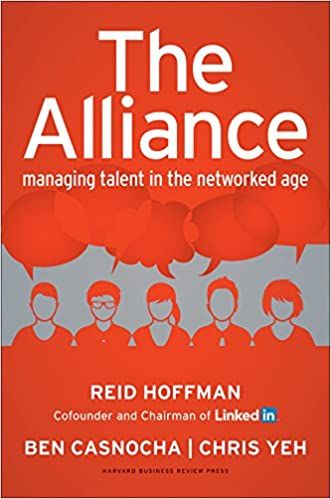“The Alliance: Managing Talent in the Networked Age” focuses on the idea of a “tour of duty” as a way to manage talent in the modern workplace. The book suggests that employers and employees should approach their working relationship as a mutually beneficial alliance with a defined mission or objective, rather than a traditional, lifelong employment contract.
The tour of duty
The “Tour of Duty” is a mutual commitment between employer and employee to work together towards a specific goal for a defined period of time. It is a flexible alternative to the traditional employment contract that benefits both parties, allowing employers to attract and retain top talent, while also giving employees the opportunity to grow their skills and achieve their career goals.
Talent networks
Employers can benefit from creating talent networks that connect current and former employees, industry experts, and potential recruits. By leveraging these networks, employers can tap into a diverse pool of talent and build relationships that last beyond individual tours of duty.
Communication
Clear and effective communication is essential for successful alliances between employers and employees. Employers should be transparent about their goals and expectations, while employees should be open about their career aspirations and skill development needs. Regular check-ins and feedback sessions can help ensure that both parties are on the same page.
Building a culture of alliances
Building a culture of alliances requires commitment from both employers and employees. Employers should create a culture that values collaboration, continuous learning, and shared success. Employees should be willing to take on new challenges, embrace change, and work towards a shared mission.
By building a culture of alliances, both parties can benefit from long-lasting relationships that support career growth and business success.
Continuous learning
Continuous learning is essential in the networked age. Employers should encourage employees to develop new skills and acquire knowledge through formal and informal training opportunities. Employees should also take responsibility for their own learning and seek out opportunities to expand their knowledge and expertise.
Building trust
Building trust is essential for successful alliances between employers and employees. Employers should be transparent about their goals and expectations, while employees should be open about their strengths, weaknesses, and career aspirations. By establishing mutual trust, both parties can work towards a shared mission and achieve their goals.
Redefining the employee relationship
The traditional employee-employer relationship is changing. Instead of a lifelong contract, employers and employees should view their relationship as a series of tours of duty. This allows for flexibility and adaptability in the networked age, enabling employees to take on new challenges and develop new skills.
Designing tours of duty
Designing effective tours of duty requires careful planning and consideration. Employers should identify specific goals and objectives for each tour, as well as the skills and experience required to achieve them. Employees should be given the opportunity to provide input and feedback, and tours of duty should be evaluated on a regular basis.
Embracing change
Employers and employees must embrace change in order to stay competitive in the networked age. Rather than fearing change, both parties should embrace it as an opportunity to learn and grow. Employers should encourage employees to take risks and experiment, while employees should be willing to adapt to changing circumstances and take on new challenges.
Aligning interests
Successful alliances are built on aligning interests between employers and employees. Employers should identify the employee’s career aspirations and align them with the company’s goals, offering opportunities for skill-building, mentorship, and career growth. By aligning interests, both parties can benefit from the alliance.


Member discussion: